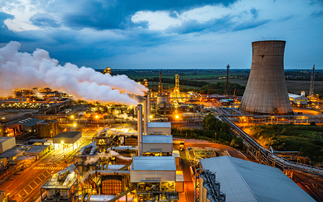The past week provides an avalanche of evidence that the climate strike movement is working
Today thousands of people across the UK and millions of people around the world, the majority of them children and young people, will take to the streets and strike in support of bolder climate action. They will experience the frisson of protest, the joy of community, the catalysing buzz of action. And then, as they head home, or perhaps even before they pack up their placards, they will experience the disorientating cognitive dissonance, the gnawing doubt of all protest movements throughout history, they will ask themselves the critical question: 'is this really making a difference? Is it working?'
Know this: It's working.
Inevitably the caveat to such an optimistic assessment is that it is not working fast enough - or more precisely the strikes did not start early enough. After all, the scientific updates could hardly be bleaker.
A report yesterday from PwC warned that to keep temperature increases below 1.5C and avoid the worst impacts of climate change the global economy has to reduce its carbon intensity seven times faster than current trends. Worse still, the target of cutting carbon intensity 7.5 per cent a year, every year from now until the end of the century is like a required run rate in cricket - each year that passes without achieving the target means it gets higher the following year. The carbon intensity of the global economy fell by just 1.6 per cent last year. We are miles behind the rate required, and Steve Smith is not coming to save us.
And that is just the start of the bad news. Today a group of the world's top climate economists publish a stark analysis warning that world leaders are relying on economic climate risk assessments that "have been omitting or grossly underestimating many of the most serious consequences for lives and livelihoods".
It's obvious when you think about it, but all those serious-minded studies suggesting climate change could knock 10 or 15 or even 20 per cent off GDP by 2100 are basically sketchy as hell. They are a finger in the wind when we don't and can't know how serious climatic tipping points could prove and can have little confidence in predictions as to how people and economies will respond to unprecedented impacts. Given the Masters of the Universe couldn't successfully model what would happen to the economy if a few sub-prime mortgages in New Mexico and Florida defaulted, this should not be seen as a controversial conclusion.
It is also worth noting that the leader of the world's most powerful economy prides himself on his ability to ignore even the overly cautious assessments of escalating climate risks. He could yet win another term and in dosing so embolden his pollutocrat allies around the world.
Consequently, in terms of global emissions and myriad other depressing metrics the climate strikes are demonstrably not working - yet. But it is that 'yet', which is crucial. Because there are other ways to measure the success of a movement, and they provide plenty of evidence the school strikes are working. On a lag time, yes, but working all the same.
That is not to say the strikes are working in precisely the way envisaged by some (but absolutely not all) of the climate strikers. As CapX's Robert Colville has pointed out this morning in a viral Twitter thread many of the demands put forward by the climate strike organisers are hugely controversial and legitimately contestable, or, in his words, "fundamentally illiberal" and "fundamentally misguided".
Today is climate strike day. Millions of people across the world, according to the organisers, will be marching to save the planet.
— Robert Colvile (@rcolvile) September 20, 2019
But having dug into what they're actually marching for, I'm profoundly uneasy. So uneasy, in fact, that it's time for a THREAD.
He does have a point. There are intense and important debates underway about almost all the organisers' proposals: the viability of climate reparations, whether we should aim for 100 per cent renewables or focus on clean energy as a whole, whether we should rule out carbon trading and geo-engineering, and if it is even possible, let alone desirable, to deliver net zero emissions within 10. The climate strike organisers obviously have their views on these questions, but the millions of protestors who have joined them will have their own positions on such complex issues.
Suffice to say, if, as Colville contends, the goal of activists is to deliver a "utopian authoritarianism" capable of building a net zero economy by 2030 then their chances of success look pretty negligible. The economic and political order will likely shift as the world decarbonises - indeed, it may have to. But a complete end to all market-based policies, democratic norms, various proven clean technologies that could help deliver net zero emissions? We live in volatile times, but there is not much evidence of such an agenda gaining political or popular traction any time soon.
But what if that was just one strand of the climate strikes movement? And what if that strand could not really command support from many of those out protesting, including the many businesses joining students today in taking to the streets? What if the strikes had a simpler goal? A goal to raise awareness of the true scale of the climate threat, to highlight how current efforts to tackle it have objectively failed, and to demand serious and sustained action, to, in Greta Thunberg's words, "tell the truth".
Well, against that goal the strikes are working.
The evidence is everywhere. Not a day goes by without polling showing the public, both nationally and globally, regards the environment as a more important issue than ever before. Meanwhile, on Monday around 60 world leaders, including British Prime Minister Boris Johnson, will address the UN in New York and present proposals to strengthen their existing climate action plans. Many more leaders wanted to speak, but were apparently told there was only room for those nations offering the boldest upgrades on their current climate commitments.
More important still, hundreds of the world's largest companies are committing to genuinely deep decarbonisation and supporting their plans with serious cash and technical nous. In the past week alone, the world's largest food company, Nestle, has said it will go net zero emission by 2050; the world's largest online retailer, Amazon, has said it will get there by 2040 (and ordered 100,000 electric vehicles to help it along the way); and the UK's soon to be second biggest energy company, OVO Energy, has said it'll be net zero by 2030 and is re-vamping its entire business in support of the goal. Meanwhile, a hydrogen fuelled plane is being readied for take-off, Unilever has gone 100 per cent renewable powered on five continents, and the next wave of UK offshore wind farms will be so cheap they will bring down consumer bills. And that's just the news from this week. Next week in New York scores of further announcements are planned.
Protestors can't take all the credit for this step-change in political and corporate engagement, of course. As I argued at the start of the year, political and corporate leaders are being squeezed by four forces, all of which are interacting and reinforcing each other. First, the technology cost curves have fallen so fast that the economics of decarbonisation are tilting rapidly in favour of faster action, as evidenced by today's offshore wind auction. Second, the physical impacts and costs of climate change are becoming so traumatisingly obvious that denial and delay has become increasingly untenable. Third, policymakers have spent two decades experimenting with the best mechanisms for driving emissions reductions and there is a now a proven playbook to draw on. The one silver-lining in PwC's report this week was the evidence that some countries, including the UK, were demonstrating how rapid decarbonisation could be sustained without undermining economic performance. But finally, the evidence is there, on the streets and in the shops, that the public will not stand for a world plunging towards a climate catastrophe and actively wants to buy-in to a cleaner, healthier economy.
Would the progress that is now being made have accelerated so rapidly without the school strikes? Absolutely not. There are well-connected people in Whitehall who are adamant that without the XR action at Easter there is no way the UK would have got its net zero legislation passed so quickly. Political parties would not now be openly competing for green votes without the visible reminder that those votes exist. And it is self-evident that businesses all around the world have fast-tracked their decarbonisation plans in response to the signals they are getting from the streets.
There has also been a tangible shift in the way corporate leaders now talk about the climate emergency. For years well intentioned businesses would tout emission reduction plans, before quickly insisting 'we're doing this because it makes business sense' and talking about returns on investment and cost efficiencies. They were right to do so and the financial side of the equation is still critical. But something was lost in the technocratic approach to staving off a civilisation-level disaster. Now, the boss of Nestle declares "we are running out of time", while the CEO of OVO hymns the historic turning point that we are all privileged to live through. The language has changed, and with it the commitment and the seriousness of the response. The climate strikers did that.
Enormous challenges remain, of course. As the protests become more successful the backlash will become ever more intense. President Trump and the forces of pollutocrat authoritarianism still threaten to derail the progress that is being made. We've left it far too late and as a result some disastrous climate impacts are already locked into all our futures. But equally, the politics, the technology, the economics, and the public engagement in support of a global net zero transition have strengthened beyond all recognition over the five years since the Paris Agreement was signed. There is no sign of that momentum being squandered. Instead it is building by the week.
So if in the wake of today's protests the gnawing doubts return as the evidence of the huge scale of the climate threats continues to stack up, remember this: the strikes are working, don't quit now.









